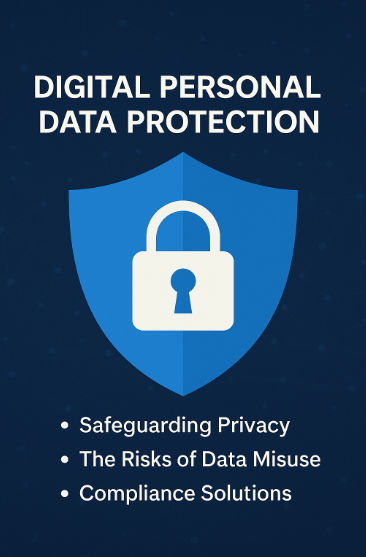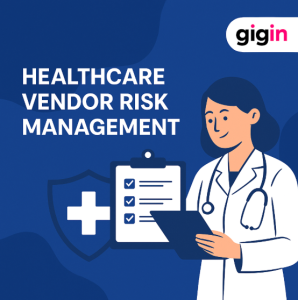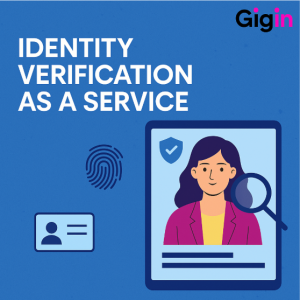Digital personal data protection has become non-negotiable these days. As our lives become increasingly digital, the amount of personal information we share online continues to grow. From signing up for services to applying for jobs, our data is constantly in motion, and that makes data protection more crucial than ever. Let’s understand the significance of digital personal data protection, the risks of data misuse, and how Verifyin by Gigin helps businesses comply with regulations and protect user privacy.
Table of Contents
- What is Digital Personal Data Protection?
- Why Personal Data Needs Protection in the Digital Era?
- Digital Personal Data Protection: The Risks of Poor Data Protection Practices
- Use Cases: Where Personal Data Protection Is Critical
- Verifyin by Gigin: Helping Companies Stay Data-Privacy Compliant as per Digital Personal Data Protection Act
- Towards a Privacy-First Future
- FAQs
What is Digital Personal Data Protection?
Digital personal data protection refers to the practices, technologies, and legal frameworks designed to safeguard an individual’s personal information in digital environments. This includes everything from names, contact details, and government IDs to financial records and online behavior. With rising concerns over data misuse, breaches, and privacy violations, personal data protection ensures that such sensitive information is collected, stored, processed, and shared responsibly, only with consent and under strict compliance with laws like India’s DPDP Act and the GDPR.
Check Here: Corporate Due Diligence
Why Personal Data Needs Protection in the Digital Era?
With the click of a button, we share names, contact details, Aadhaar numbers, bank information, and more. While this streamlines digital interactions, it also opens doors to identity theft, fraud, phishing, and unauthorized profiling. The sheer volume of personal data circulating in cloud systems and databases makes it a goldmine for cybercriminals and a compliance nightmare for businesses. Failing to protect this data doesn’t just damage user trust but can lead to legal action, fines, and brand damage.
Digital Personal Data Protection: The Risks of Poor Data Protection Practices
When personal data isn’t handled responsibly, it doesn’t just put individuals at risk. It exposes businesses to significant legal, financial, and reputational damage. In today’s digital landscape, overlooking proper data protection protocols can lead to a chain reaction of costly consequences. Here are some of the key risks companies face when personal data is not secured adequately:
- Data Breaches: Unauthorized access to customer databases can result in sensitive information being leaked or sold on the dark web.
- Legal Penalties: Non-compliance with data protection laws such as India’s DPDP Act or GDPR can lead to steep fines.
- Reputational Damage: Losing control over customer data can lead to public outrage and erosion of customer trust.
- Operational Disruption: Breaches often trigger lengthy investigations, system audits, and resource-intensive legal processes.
Use Cases: Where Personal Data Protection Is Critical
Personal data protection isn’t limited to tech companies or IT teams. It’s a priority across industries where customer information is collected, stored, or processed. From recruitment to finance and healthcare, organizations must adopt stringent data privacy practices to maintain trust and meet compliance standards. Below are some key scenarios where strong data protection measures are non-negotiable:
- Job Portals & Recruitment Platforms: Storing candidate resumes and KYC data without proper encryption and access controls can result in privacy violations and regulatory issues. Digital Personal Data Protection becomes essential in such cases.
- Financial Services: Personal information linked to PAN, Aadhaar, and bank accounts is highly sensitive. Strong protection measures must be in place to avoid fraud and ensure compliance.
- Healthcare Systems: Patient records, prescriptions, and medical history must be kept confidential, making data protection a legal and ethical priority.
- E-commerce Platforms: Every user’s payment and address data must be safeguarded to prevent identity theft and cyberattacks.
Check Here: KYC for High Risk Customers
Verifyin by Gigin: Helping Companies Stay Data-Privacy Compliant as per Digital Personal Data Protection Act
Understanding complex data protection regulations can be overwhelming for businesses, especially as compliance standards continue to evolve. That’s where Verifyin by Gigin steps in with smart, scalable solutions designed to simplify privacy management while keeping user trust intact. Here’s how Verifyin by Gigin empowers organizations to stay on the right side of data laws and build a privacy-first approach:
- Secure KYC Verification: Data is collected, encrypted, and stored securely, ensuring compliance with data protection regulations.
- Consent Management: Verifyin by Gigin ensures that users give explicit consent before their data is used, helping companies stay transparent and legally protected.
- Audit-Ready Logs: Maintain clear records of who accessed what data and when, supporting audits and regulatory reviews.
- Automated Expiry & Deletion: Enforces data retention policies by deleting personal data after a set period, reducing the risk of long-term exposure.
Towards a Privacy-First Future
Digital Personal Data Protection is not just information, but it’s identity, trust, and security. In an age where breaches are common and privacy violations costly, businesses must adopt a proactive stance. With Verifyin by Gigin, companies can embed privacy into their processes, meet compliance standards, and build lasting relationships with their users. By making data protection a core business value, you not only avoid risk but also gain trust.
FAQs
What qualifies as personal data in the digital space?
Personal data includes any information that can identify an individual, directly or indirectly. This can be basic details like name, email ID, or phone number, etc. It also includes sensitive information like Aadhaar numbers, financial records, location data, IP addresses, biometric data, and even online behavior. In the digital age, even metadata linked to personal activities can be considered personal data if it helps in identifying a user.
Why is digital personal data protection necessary for businesses?
Data protection is not just a legal requirement. It’s a trust-building exercise. Customers today are highly aware of how their data is used. Businesses that fail to protect personal data risk losing their customers’ trust, facing legal penalties, and damaging their brand reputation. Complying with data protection regulations ensures safer operations, reduces breach risks, and creates a privacy-first brand image that appeals to conscious consumers.
What is India’s Digital Personal Data Protection (DPDP) Act?
The DPDP Act, passed in 2023, is India’s comprehensive law governing the processing of personal digital data. It mandates that companies collect and use personal data only with user consent, maintain transparency in data usage, ensure data security, and allow individuals to withdraw consent or request deletion. It applies to all entities processing personal data digitally within India and even abroad if the data pertains to Indian citizens.
How can businesses ensure compliance with data protection laws?
To stay compliant, businesses must adopt clear privacy policies, secure data through encryption, implement consent mechanisms, restrict data access internally, and maintain audit trails. Verifyin by Gigin simplifies this by offering tools for secure KYC, consent tracking, data lifecycle management, and breach monitoring, ensuring businesses are both efficient and compliant.
What happens if a company fails to protect personal data?
Non-compliance can lead to serious consequences: hefty fines under laws like the DPDP Act or GDPR, legal notices, loss of customers, and brand damage. In severe cases, companies may be barred from processing personal data or face lawsuits. More importantly, the breach of user trust can have long-term negative impacts on customer loyalty and market standing.














